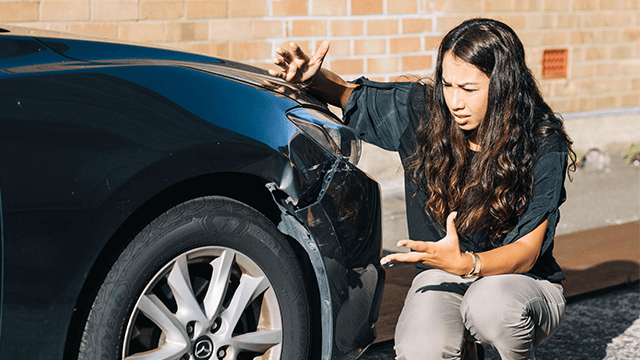What to do after a minor car accident
Matilda Douglas-Henry
So, you’ve gotten into a car accident. Luckily there are no major injuries or serious damage to you or anyone else’s vehicle, but what do you do next? There are still important steps to follow, and this article has got you covered.
Here you’ll find everything you need to know about what to do after a minor car accident, including:
- What to do in the immediate aftermath of an accident
- What to do for your insurance
- Follow-up services after a car accident
- Minor car accident procedures by state

What to do in the immediate aftermath of an accident
It’s natural to feel shaken up, even in the least severe of collisions, so do your best to collect yourself and take deep breaths. It’s hard to help others until you are certain you’re fit to do so, so check yourself first for any injuries, then make sure everyone is safe. If there is any need for medical aid, do what you can but call the ambulance immediately.
Pull over, but only once you have checked the road and your surroundings, and you know it is safe to do so. Then you will be able to exit the car and check on the other vehicles involved in the accident.
What to do for your insurance
For the sake of your insurance policy (you can find more tips on that here), you must carry out a specific set of instructions as soon as you’ve had any sort of car accident. Be sure to do the following:
- Exchange details with the other driver: Name, registration, contact number, address, licence number, CTP insurance and policy, and a brief statement are all necessary. If there were any witnesses, exchange details with them too.
- Take notes: Document what happened from your perspective, taking into consideration weather conditions, traffic signs, etc. Take photos/videos of the damage.
- Report the incident: It’s almost always a good idea to report an accident to the police, but above all notify your insurer. Do this ASAP to avoid any delays in your claim being processed.
- Get insurer approval before seeking out repairs: Many insurers have suppliers that they regularly work with, and prefer that you use them for any repairs—in some cases this can include services that will be required immediately, like tow trucks. Using these preferred suppliers will likely speed up your claim’s processing time too. If you’d prefer to work with your local panel beaters, make sure you get your insurer’s approval on quoted costs, and keep receipts of all payments for reimbursement.
Are there any follow-up services I need to contact after an accident?
Even when your car accident is relatively minor, you should call the police if any sort of damage has occurred. This doesn’t mean anyone is in trouble: police presence will warrant greater impartiality for determining who was at fault, which will allow your insurance claim to be processed with greater ease*.
It’s also important to assess whether your vehicle is in a fit condition to drive away from the site of the accident. If not, you will need to organise a tow to pick up your car; as we mentioned in the previous section, run this by your insurance provider first, because they might have a preferred supplier for you to work with.
Minor car accident procedures by state
Compulsory third party (CTP) insurance is mandatory in Australia, most Australian states have the same necessary procedures in the event of a minor car accident, but naturally certain steps will require state government-specific instructions rather than nationwide ones. For example, there will be differentiations on which number to call if you need a tow truck, or time limits on making an insurance claim.
There will also be slight differences in how to report the accident. In the event of injury, you will contact the state-based commission to follow up on insurance procedures; in Victoria, for example, this is the Transport Accident Commission (TAC). States will also have different forms that need to be filled out that more or less cover the same ground: South Australia requires a Vehicle Collision Report (VCR)*, and New South Wales will ask for an Accident Notification Form (ANF)*.
In Western Australia, there is a law mandate that requires any driver involved in a crash to stop and supply their name and address*. Indeed, it is a criminal offence across the country to flee the scene of any car accident. It is vital to stay where you are and provide as much information as you can.
Conclusion
We hope this article has you feeling a little more prepared in the event of a car accident; no matter how minor, they are always scary to be involved in. Remember to stay calm, gather your thoughts, and be as truthful and honest as possible. If your car is safe enough to drive away from the scene after following all the necessary steps, use DingGo’s quick quotes service for easy, affordable access to panel beating services.
